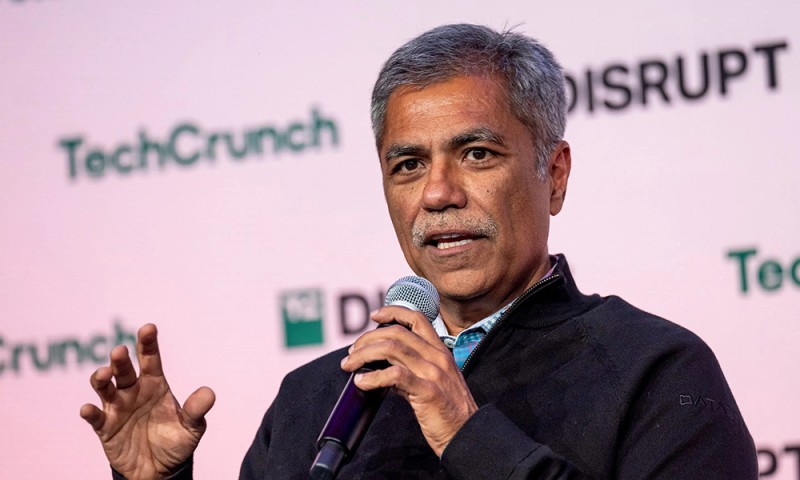
切特·卡普尔如今是数据与人工智能公司DataStax的首席执行官,而他在印度加尔各答成长阶段,常翻阅一本名为《小王国》(A Little Kingdom)的书。该书讲述了史蒂夫·乔布斯(Steve Jobs)及其创立的苹果公司的崛起历程,这让他萌生了远大梦想。
“我被书中的故事深深吸引,渴望为史蒂夫·乔布斯工作。”卡普尔向《财富》杂志透露,而他后来确实达成了这一心愿。
1983年,他先从印度远赴美国,随后“狂补计算机课程”,为能获得相关工作机会接近这位已故苹果创始人做准备。
几年后,卡普尔成功获得NeXT Computer的实习机会,梦想成真——不过他坦言,自己本质上是实习生的实习生。
“我曾是那个给煮咖啡的人端咖啡的人,”他笑着说。“无论做什么都无所谓。哪怕是打扫卫生、洗碗——只要能待在离史蒂夫·乔布斯二十码(约合18.3米)的范围内。”
付费以跟偶像共事
即便乔布斯根本不认识卡普尔,他仍认为,在传奇企业家身边工作的这段经历,对自己影响深远——甚至建议毕业生自掏腰包去争取这样的工作机会。
“我告诉大学毕业生:找到一群你真正渴望与之共事的人,说服他们‘缺你不可’,最后哪怕付钱,也要争取到为他们效力的机会。”他强调职业生涯的前四年将塑造个人性格与职业轨迹。
“与真正聪明的人共事所积累的经验,将为你带来超乎想象的回报,”他说。“决定你价值的并非所在的公司,而是与你共事的伙伴。”
若你认为在生活成本危机之下,这种建议既难以负担,又带有精英主义色彩。卡普尔认为,对于那些已花费数万美元攻读学位的毕业生而言,这是一项更具价值的投资。
"想想看,对吧?毕业生刚支付了20万美元学费。而我在他们毕业前夕告诉他们:这笔钱其实没花在刀刃上。让我告诉你该怎么花:专注于你要共事之人,因为这会改变你的职业生涯。"
话虽如此,卡普尔本人其实接受过高等教育。
尽早开启创业征程
当其他人还在参加兄弟会派对时,卡普尔已经在兼顾学业的同时,运营咨询公司、在快餐连锁店打工,还在乔布斯的NeXT实习。
22岁时,卡普尔便迅速掌握了一项关键技能:平衡收支。
“赚钱对我来说不是‘可有可无’的事,而是必需——因为我要靠它支付学费,”他解释道,“若赚不到钱,我就无法继续学业。”
回顾这段岁月,卡普尔称之为“勉强维持生计的日子”,但他强调“没有任何一段经历”能像自己当老板那样,磨砺领导力。
毕业后,他从乔布斯的实习生起步,十五年间迅速晋升为开源软件公司Gluecode的首席执行官——他仅用6个月就将Gluecode出售给IBM。
“每个人的职业生涯都会经历三个阶段:从独立贡献者,到管理他人,再到领导管理者,”他耸耸肩说,“所以我认为,每个人都必须经历这一过程。”
不过,首席执行官的年龄通常在50岁以上,显然卡普尔的晋升速度远超常人。他认为,关键在于职业生涯初期的自我领导方式。
“这绝无捷径可寻,你必须先学会自我领导,才能领导小团队,进而领导管理者。归根结底,我觉得这一切都取决于你如何看待自我领导。”
卡普尔表示,自己始终将团队的成功置于个人贡献之上,并且专注于“把执行工作做到尽善尽美”。
“归根结底,‘相信自己’是件轻而易举的事。你可以阅读领导力书籍,学习各种理论。但若不能用这种方式领导自己,就无法领导他人。”
切勿为出售企业做准备
在成功推动Gluecode以未公开金额被IBM收购后,卡普尔于2007年出任数据分析软件公司Apigee的首席执行官。
在其领导下,公司成功完成品牌重塑,吸引网飞(Netflix)、塔吉特(Target)、沃尔格林(Walgreens)等大型客户,并通过公开首次公开募股融资8700万美元,最终于2016年以6.25亿美元被谷歌(Google)收购。
卡普尔针对企业出售筹备事宜给出唯一建议:切勿如此行事。
“我的建议是专注于构建业务、招募优秀人才、赢得优质客户,其余一切自会水到渠成。”他表示。
即便如今,他的经营信条依然是:“我们挂着‘开门营业’的牌子,而不是‘待售’的牌子。”(*)
译者:中慧言-王芳
切特·卡普尔如今是数据与人工智能公司DataStax的首席执行官,而他在印度加尔各答成长阶段,常翻阅一本名为《小王国》(A Little Kingdom)的书。该书讲述了史蒂夫·乔布斯(Steve Jobs)及其创立的苹果公司的崛起历程,这让他萌生了远大梦想。
“我被书中的故事深深吸引,渴望为史蒂夫·乔布斯工作。”卡普尔向《财富》杂志透露,而他后来确实达成了这一心愿。
1983年,他先从印度远赴美国,随后“狂补计算机课程”,为能获得相关工作机会接近这位已故苹果创始人做准备。
几年后,卡普尔成功获得NeXT Computer的实习机会,梦想成真——不过他坦言,自己本质上是实习生的实习生。
“我曾是那个给煮咖啡的人端咖啡的人,”他笑着说。“无论做什么都无所谓。哪怕是打扫卫生、洗碗——只要能待在离史蒂夫·乔布斯二十码(约合18.3米)的范围内。”
付费以跟偶像共事
即便乔布斯根本不认识卡普尔,他仍认为,在传奇企业家身边工作的这段经历,对自己影响深远——甚至建议毕业生自掏腰包去争取这样的工作机会。
“我告诉大学毕业生:找到一群你真正渴望与之共事的人,说服他们‘缺你不可’,最后哪怕付钱,也要争取到为他们效力的机会。”他强调职业生涯的前四年将塑造个人性格与职业轨迹。
“与真正聪明的人共事所积累的经验,将为你带来超乎想象的回报,”他说。“决定你价值的并非所在的公司,而是与你共事的伙伴。”
若你认为在生活成本危机之下,这种建议既难以负担,又带有精英主义色彩。卡普尔认为,对于那些已花费数万美元攻读学位的毕业生而言,这是一项更具价值的投资。
"想想看,对吧?毕业生刚支付了20万美元学费。而我在他们毕业前夕告诉他们:这笔钱其实没花在刀刃上。让我告诉你该怎么花:专注于你要共事之人,因为这会改变你的职业生涯。"
话虽如此,卡普尔本人其实接受过高等教育。
尽早开启创业征程
当其他人还在参加兄弟会派对时,卡普尔已经在兼顾学业的同时,运营咨询公司、在快餐连锁店打工,还在乔布斯的NeXT实习。
22岁时,卡普尔便迅速掌握了一项关键技能:平衡收支。
“赚钱对我来说不是‘可有可无’的事,而是必需——因为我要靠它支付学费,”他解释道,“若赚不到钱,我就无法继续学业。”
回顾这段岁月,卡普尔称之为“勉强维持生计的日子”,但他强调“没有任何一段经历”能像自己当老板那样,磨砺领导力。
毕业后,他从乔布斯的实习生起步,十五年间迅速晋升为开源软件公司Gluecode的首席执行官——他仅用6个月就将Gluecode出售给IBM。
“每个人的职业生涯都会经历三个阶段:从独立贡献者,到管理他人,再到领导管理者,”他耸耸肩说,“所以我认为,每个人都必须经历这一过程。”
不过,首席执行官的年龄通常在50岁以上,显然卡普尔的晋升速度远超常人。他认为,关键在于职业生涯初期的自我领导方式。
“这绝无捷径可寻,你必须先学会自我领导,才能领导小团队,进而领导管理者。归根结底,我觉得这一切都取决于你如何看待自我领导。”
卡普尔表示,自己始终将团队的成功置于个人贡献之上,并且专注于“把执行工作做到尽善尽美”。
“归根结底,‘相信自己’是件轻而易举的事。你可以阅读领导力书籍,学习各种理论。但若不能用这种方式领导自己,就无法领导他人。”
切勿为出售企业做准备
在成功推动Gluecode以未公开金额被IBM收购后,卡普尔于2007年出任数据分析软件公司Apigee的首席执行官。
在其领导下,公司成功完成品牌重塑,吸引网飞(Netflix)、塔吉特(Target)、沃尔格林(Walgreens)等大型客户,并通过公开首次公开募股融资8700万美元,最终于2016年以6.25亿美元被谷歌(Google)收购。
卡普尔针对企业出售筹备事宜给出唯一建议:切勿如此行事。
“我的建议是专注于构建业务、招募优秀人才、赢得优质客户,其余一切自会水到渠成。”他表示。
即便如今,他的经营信条依然是:“我们挂着‘开门营业’的牌子,而不是‘待售’的牌子。”(*)
译者:中慧言-王芳
Growing up in the city of Kolkata in India, a young Chet Kapoor, now the CEO of data and AI company DataStax, would often turn to the pages of A Little Kingdom, a book about the meteoric rise of Steve Jobs and his enterprise Apple, and dream big.
“I was fascinated. I wanted to work for Steve Jobs,” Kapoor tells Fortune—and that’s exactly what he did.
His first order of business was moving from India to the States in 1983 before taking on “a bunch of computer classes” to prime himself for any role in the vicinity of the late Apple founder.
Kapoor accomplished that dream just a few years later when he bagged an internship at NeXT Computer—although he admits he was essentially the intern to the intern.
“I was the guy that got coffee for the guy that made coffee,” he laughs. “It didn’t matter what I did. Janitorial services, dishes—I was 20 yards away from Steve Jobs.”
Pay to work with your hero
Even if Jobs didn’t know who Kapoor was, by his own account, he still thinks that working in the shadows of an esteemed entrepreneur was a formative experience—one he even advises graduates to pay for.
“What I tell college graduates is to find a set of people you want to really work with, convince them that they need you, and then pay them to let you work for them,” he says, insisting the first four years of your career shapes your personality and professional trajectory.
“The experience you will get from working with really smart people will pay you dividends that you cannot imagine,” he says. “It’s not the company you work for, it is the individuals you work with that define you.”
If you’re thinking the advice sounds unaffordable during a cost-of-living crisis (as well as elitist), he argues it’s better value for those who are already spending thousands of dollars on a degree.
“Think about it, right? College graduates have just paid $200,000 in tuition. And I’m talking to them at the end of the senior year saying, that’s actually not a great use of money,” he explains. “Let me tell you how you could have used it: Focus on the people that you work with, because that’ll change your career.”
That being said, Kapoor did go to college himself.
Start your entrepreneurial journey as soon as possible
While others were at frat parties, Kapoor was juggling his education with running his own consulting firm, working in fast food chains, and interning at Jobs’ NeXT.
A skill Kapoor was quick to learn at just 22 years old was how to balance profit and loss.
“It was not a ‘nice to have’ for me, it was important that I made money because that’s how I paid for tuition,” he explains. “So if I didn’t make money, I couldn’t go to school.”
Looking back on his life, Kapoor describes it as a “hand-to-mouth existence” but says that there’s “nothing” like being your own boss to prepare you for leadership.
After graduating, he climbed the ranks quickly from Jobs’ intern to the CEO of Gluecode, an open-source software he sold to IBM in a mere six months, in around 15 years.
“Every individual goes through three different stages in their career. They are individual contributors, they manage people, and then they lead managers,” he shrugs. “So, I believe everyone has to go through that journey.”
But with the average CEO over 50 years old, it’s clear he went through that process at lightning speed. He said he believes it’s down to how you show up in the early years of your career.
“There’s no magic bullet here, you have to lead yourself, then you can lead a small team, and then you lead leaders, right? And I think it all comes down to how you think about leading yourself.”
Kapoor says he concentrated on the team’s success over his own contributions and nailed the execution.
“At the end of the day, belief [in one’s self] is cheap. You can read leadership books, and this and that. But if you don’t lead yourself that way, you will not be able to lead people.”
Don’t prime your business for sale
After orchestrating the sale of Gluecode to IBM for an undisclosed amount, Kapoor became the CEO of the analytics software Apigee in 2007.
Under his helm, the company underwent a successful rebranding; attracted big clients like Netflix, Target, and Walgreens; and raised $87 million through a public IPO before being acquired by Google for $625 million in 2016.
Kapoor has one tip for priming a business for sale: Don’t.
“My take would be to focus on building a business, hiring great people, getting great customers, and then everything else happens around it,” he says.
Even now, he says that his motto is always: “We have an open-for-business sign, not a business-for-sale sign.”

